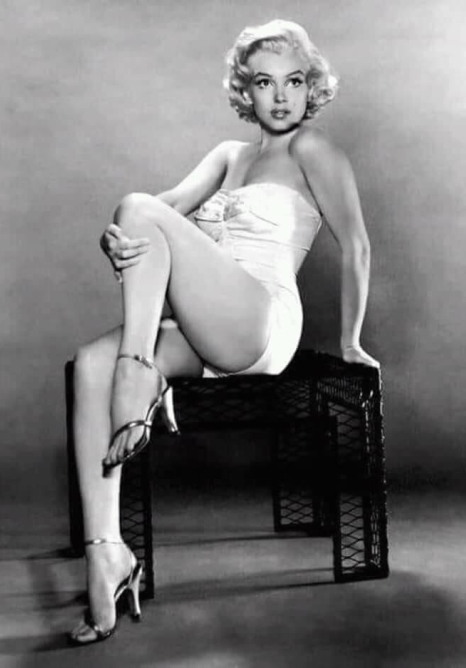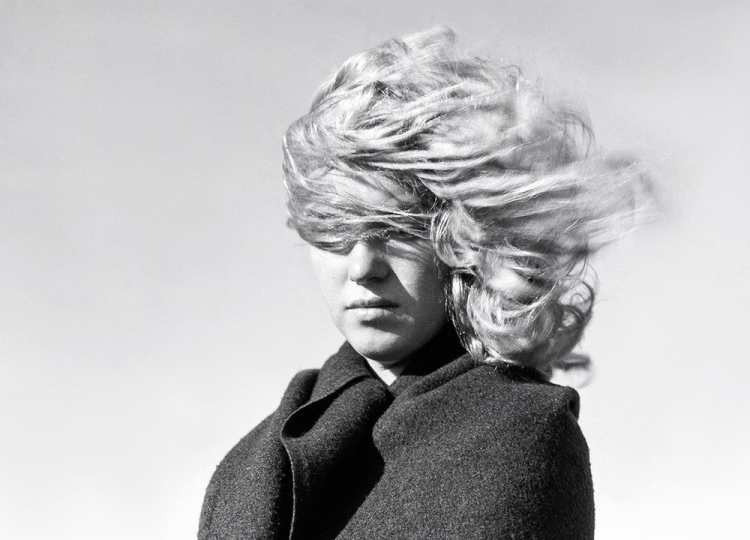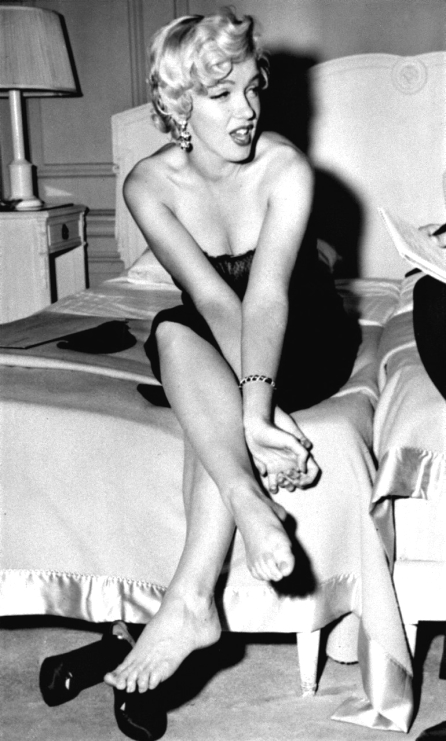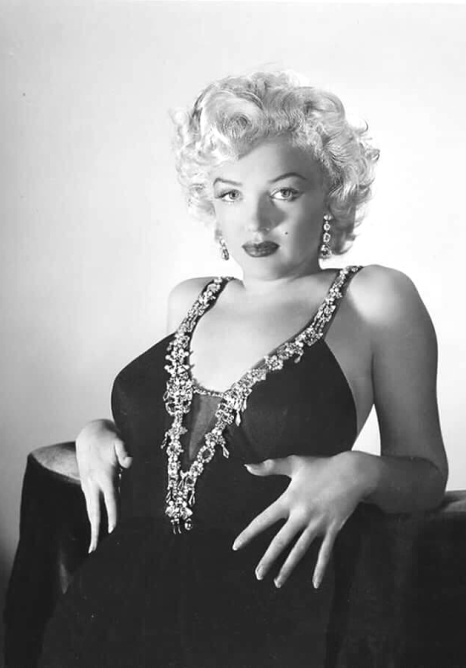Will Fowler, Marilyn and Me and Howard Rosenberg
In his memoir, Fowler admitted that he once considered Slatzer to be a harmless faker (Fowler 288), a pretender and a wannabe. In his Papers, Fowler noted: When I was working for 20th Century-Fox Television studios on Western Avenue in Hollywood, Slatzer would continuously call me to have his picture taken with famous motion picture actors appearing in several television series episodes for which I was handling the publicity. Fowler then added: Slatzer would go anywhere to have his picture taken with famous people he’d never met before. Then Slatzer would hang the picture on his walls and pretend that he was acquainted with the celebrity.1WRFC,
Box 21, Folder 4, page 13 and 17.
However, Fowler’s opinion of the pretender’s harmlessness changed after learning about the production of Marilyn and Me. Through his contacts in the television industry, Fowler obtained a copy of the movie’s script; and he did not like what he read. The movie’s many falsehoods caused Fowler a considerable amount of heartburn and prompted his two letters to Howard Rosenberg.
On Friday, September the 20th in 1991, The Los Angeles Times, published a review of Marilyn and Me even though ABC Television did not telecast the movie until September the 22nd, the following Sunday evening. Publishing a movie review prior to its actual airing, even a review involving a movie made only for television, might seem slightly premature and peculiar, absent this knowledge: on the 7th of August and then again on the 12th, Will Fowler wrote to Howard Rosenberg, the LA Times‘ Pulitzer Prize winning television critic. Fowler’s letters alerted Rosenberg and warned the critic that Marilyn and Me was filled with trashy untruths.
Along with his August the 7th letter,2WRFC Box 24, Folder 5. The first letter Fowler wrote to Rosenberg, dated 7 August 1991, is four pages long and appears on pages 80 through 83. The second letter, dated 12 August 1991, is only one page long and appears on page 79.Fowler enclosed a copy of the movie’s script and noted:
I believe journalistic integrity should be upheld in all areas of news and non-fiction television presentations. In the case of the Marilyn Monroe–Robert F. Slatzer piece of trash, it is filled with lies, [particularly that] he was married to the actress [and] was the father of her aborted child. […] It was when I read […] of the disgusting Mexican MM abortion that I became livid. This is why I now go public with all this information with you, Mr. Rosenberg.3WRFC, Box 24, Folder 5. The first letter Fowler wrote to Rosenberg, dated 7 August 1991, is four pages long and appears on pages 80 through 83. The second letter, dated 12 August 1991, is only one page long and appears on page 79.
As a result of Fowler’s letters and warnings, and his expressions of distaste for the lies the movie would present as facts, Rosenberg wrote “The Strange ‘Truth’ of ‘Marilyn, Me'”, his review of ABC’s scheduled Marilyn Monroe movie.
The award winning television critic wondered in writing if the story offered by “Marilyn and Me” actually happened? Rosenberg expressed his doubts, noting that the dubitable ABC movie expected its audience to accept and believe a considerable amount of questionable assertions, that an obscure writer, unknown and therefore invisible to Marilyn’s coterie of friends, was, in fact, her close friend and confidant throughout her Hollywood years and that he secretly married Monroe in Mexico in 1952. In the movie, Monroe proposes to Slatzer after Joe DiMaggio, the man she’ll later marry, proposes to her.
What an incredible assertion, that Marilyn Monroe actually proposed marriage to Robert Slatzer! In his published review, Rosenberg also mentioned Fowler:
Will Fowler says he doesn’t believe it. Slatzer’s story is filled with lies, charges Fowler, who claims he ghost wrote the first two drafts of Slatzer’s 1974 book, The Life and Curious Death of Marilyn Monroe, on which much of the ABC movie is based. He says he withdrew as writer after becoming convinced that Slatzer’s account was baloney.4“The Strange ‘Truth’ of ‘Marilyn, Me’.” Howard Rosenberg. Los Angeles Times. 20 Sept 1991.
<http://articles.latimes.com/1991-09-20/entertainment/ca-2741_1_marilyn-monroe>
A few of Slatzer’s many cinematic lies are these: he was with Marilyn when her pregnancy, which was induced by him, was aborted on a kitchen table in Tijuana; he engaged in a competition with Joe DiMaggio for Marilyn’s love and affections; he actually encountered DiMaggio face to face and they engaged in a tense confrontation; he was in Tom Kelly’s studio the night Marilyn posed nude; and he comforted Marilyn so much on the sets of Niagara that she was able to complete the movie which exploded her into the Hollywood star field.
The facts are as follows. Tom Kelly and his wife, Natalie, as requested by Marilyn, were the only persons present in Tom Kelly’s photographic studio when Marilyn posed nude in 1949; and Slatzer had absolutely nothing at all to do with the performance Marilyn delivered on the sets of Niagara. I imagine Henry Hathaway, Niagara‘s director, would have chuckled at that assertion in ABC’s dubious movie; but Henry was not alive in 1991. Slatzer did not claim in his 1974 narrative that he impregnated Marilyn and then transported her to Tijuana for an abortion in a Mexican kitchen. Slatzer and the producers of Marilyn and Me could have borrowed that barbaric injustice and lie from Ted Jordan’s 1989 apocrypha, which appears in the next section and in which Jordan made the same declaration. Additionally, the movie’s account of Slatzer’s first contact with Norma Jeane does not match the account presented in his 1974 publication; and regarding his tense encounter with Joe DiMaggio, the Yankee Clipper consistently denied meeting Slatzer or even knowing of his existence prior to the appearance of Slatzer’s book. Fowler’s Papers contained a copy of a 1991 handwritten note, obviously written by DiMaggio in his looping cursive, dated August the 10th; it read succinctly: Dear Mr. Fowler, I never met Robert Slatzer. Sincerely, Joe DiMaggio.5WRFC, Box 23, Folder 28, page 3. Along with his succinct denial regarding Robert Slatzer, DiMaggio appended a personal message to Fowler: Tried to reach you by phone but you have an unlisted number. I had the pleasure of meeting your father several times at “Toots” Shors restaurant in New York. Best, Joe DiMaggio. P.S. Just got in from Tokyo, Japan. If you need more, let me know.
Therefore, clearly, we may conclude the following: if Slatzer did not object to adding those mendacities to his made-for-TV-Marilyn-movie, then Slatzer did not object to lying, a fact definitely proven by the evidence of considerable editing and anecdote development contained in the Fowler Papers. Facts and truth notwithstanding, ABC aired Marilyn and Me, a moved based primarily on Robert Slatzer’s contrived literary apocrypha and fraud.



